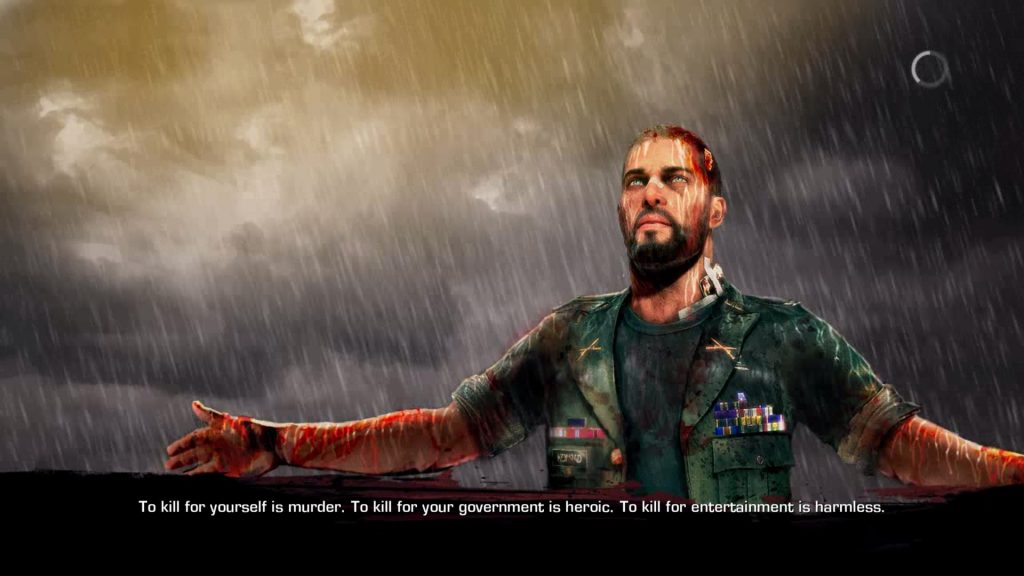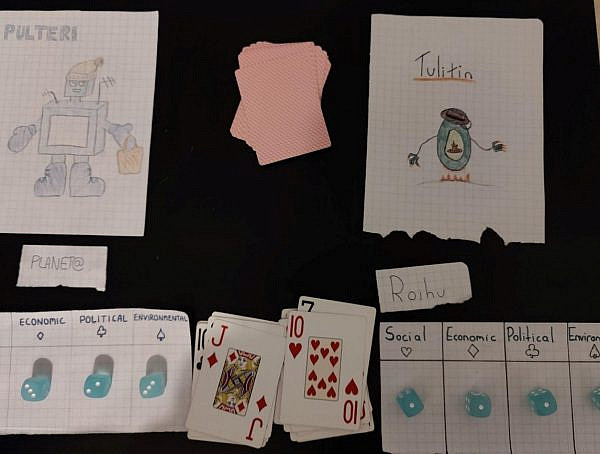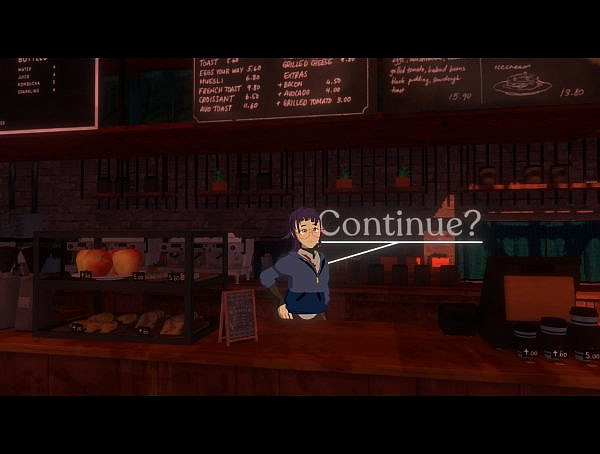As in literature and film, estrangement in games reinvigorates perception and returns a forgotten essence of things
As an interactive medium, games have a unique way of refreshing our senses. In other words, turning the mundane into something we can re-capture with our senses so that the mundane becomes explicit once again. This “estrangement” is the result of devices employed to draw attention to cultural expressions and naturalised contradictions. Two examples of these devices are ostranenie and v-effect. These have been widely used in studying representational media like literature and film. However, game scholar Holger Pötzsch shows how estrangement may be used to shed light on storytelling mechanisms in games in a different way than previous game scholars.
Estrangement occurs in representational media through devices used to de-familiarise the mundane. This can, for example, be experienced in Spec Ops: The Line, which appears to be a modern first-person shooter where the player is tasked to kill enemies in order to progress on a mission. It should be emphasised that what appears to be a run-of-the-mill first-person shooter actually has a depth to it only uncovered at a later stage of the game. In Spec Ops: The Line, the player controls Captain Martin Walker who is sent into a post-catastrophe setting with an elite Delta Force team on a recon mission. Halfay through the mission, Captain Walker’s state of mental health starts unravelling while slowly realising the horrors of war. The theme is familiar from the literary classic Heart of Darkness and the film it inspired, Apocalypse Now.
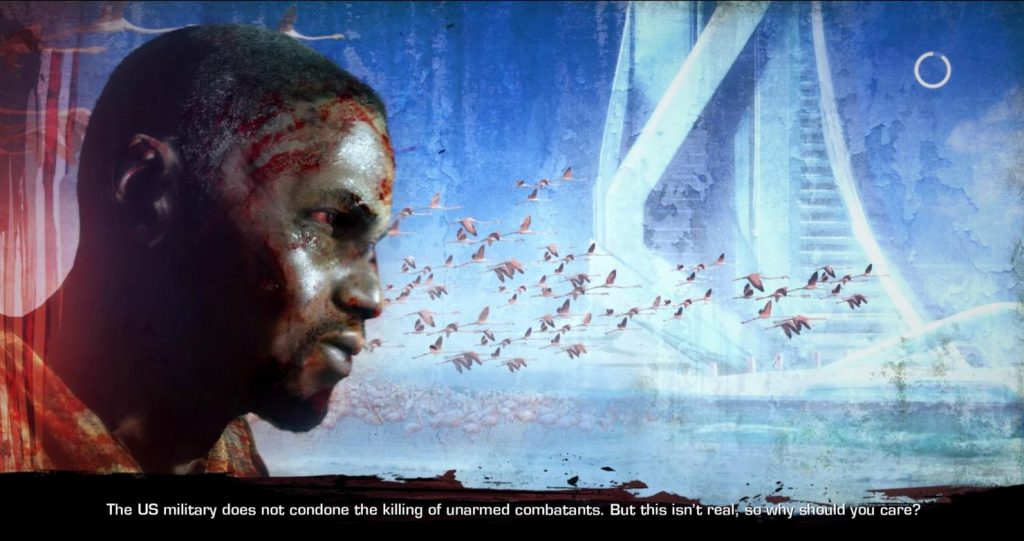
“The US military does not condone the killing of unarmed combatants. But this isn’t real, so why should you care?”
Approximately halfway through the game, loading screens between in-game sequences present content other than merely helpful tips in terms of gameplay. These “tips” concern the legitimacy of the mission and the player’s involvement in it as Captain Walker. As these tips become more frequent by the end, they question the moral dimensions of a mission where civilians and previous allies get remorselessly killed by the protagonist. The player who has so far identified with Captain Walker is reminded of her complicity in the mission through in-game action. Here, the mundane experience of first-person shooter action is de-familiarised by questioning the legitimacy of in-game violence as a means to achieve the end goal of a mission.
In his article, “Playing Games with Shklovsky, Brecht, and Boal: Ostranenie, V-Effect, and Spect-Actors as Analytical Tools for Game Studies” Holger Pötzsch sheds some light upon storytelling mechanisms in games like Spec Ops: The Line and how a more systematic approach helps reflect on and understand them. To do this, Pötzsch examines the concept of estrangement and how it is relevant for understanding games and play. The concept of estrangement originates in the work of literary scholars historically known as formalists. Viktor Shklovsky, a Russian formalist, coined the neologism “ostranenie” (= making strange) to encapsulate what he perceives as the main function of art: to refresh our senses by de-habitualising what convention has turned mundane, thus invisible. The function of art is to make us feel something anew, as if we experienced it for the first time.
The technique that art may use to refresh our senses, then, is by making things difficult to internalise. At the same time, art can challenge us as readers, spectators and users so that we do not only recognise, but truly see the world around us. Indeed, playing as Captain Walker potentially makes the player question genre conventions of FPS-games. However, through its poignant reminders of real world politics in the game, simulated through in-game action, the game may even incite the player to take political action.
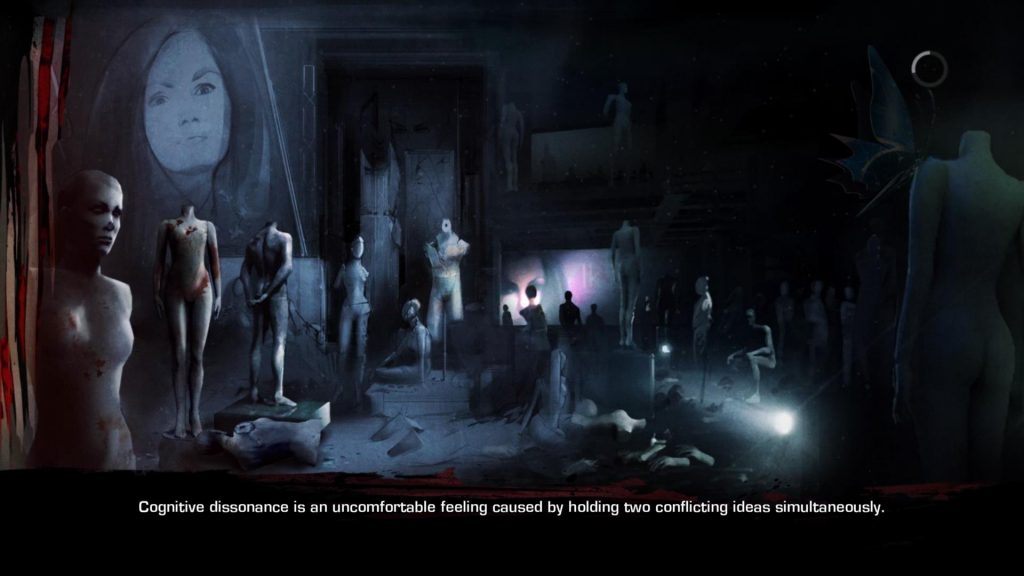
“Cognitive dissonance is an uncomfortable feeling caused by holding two conflicting ideas simultaneously.”
In essence, estrangement is the result of devices used for drawing attention to cultural expressions and naturalised contradictions by making them strange. Estrangement reinvigorates perception with the purpose of returning a forgotten essence of things. In addition, estrangement may have a political objective. The objective is grasping real relations and contradictions hidden in the apparently natural and consensual. As a device used to achieve estrangement, v-effect is inherently political in nature and may thus provide intellectual tools for politically oriented action, as intended by dramatist Bertolt Brecht who coined the term. Through its aspects of story and game, Spec Ops: The Line appears to question the conventions of FPS-games as well as putting this in the larger societal context of modern warfare. The effect of de-familiarisation in Spec Ops: The Line directly challenges the view on the violence that has already become a mundane part of first-person shooter games. This may encourage the player to approach FPS-games as a genre in a different light. In theory, as v-effect provides tools for political action, the experience may even change the player’s approach to the world.
Why is estrangement so important for understanding games, however? Pötzsch underlines that the concept can provide important insights and facilitate innovative practices in game analysis, development, design and play of digital games. In short, estrangement is the effect of certain formal properties in an artifact and which draw attention to themselves through expression. The effect that is achieved through these formal properties (or devices) is that of de-habitualisation, defamiliarisation or a new way of seeing. Estrangement also slows down and complicates processes of reading and other forms of reception, sometimes leading to direct action that can be political in nature. This is achieved through the deployment of specific formal devices that estrange the player and therefore de-habitualises automated forms of seeing and cognition. This also renews our relation to language and art – including digital games. Sometimes, we may even experience the world in a completely new way.
The original article by Holger Pötzsch, “Playing Games with Shklovsky, Brecht, and Boal: Ostranenie, V-Effect, and Spect-Actors as Analytical Tools for Game Studies” (2017) can be found here.
You might also like
More from Game Research Highlights
How do you want to do this? – A look into the therapeutic uses of role-playing games
Can playing RPGs contribute positively to your wellbeing? A recent study aims to find out how RPGs are being used …
Eldritch horrors and tentacles – Defining what “Lovecraftian” is in games
H.P. Lovecrafts legacy lives today in the shared world of Cthulhu Mythos and its iconic monsters. Prema Arasu defines the …
Are Souls Games the Contemporary Myths?
Dom Ford’s Approaching FromSoftware’s Souls Games as Myth reveals the Souls series as a modern mythology where gods fall, desires …








